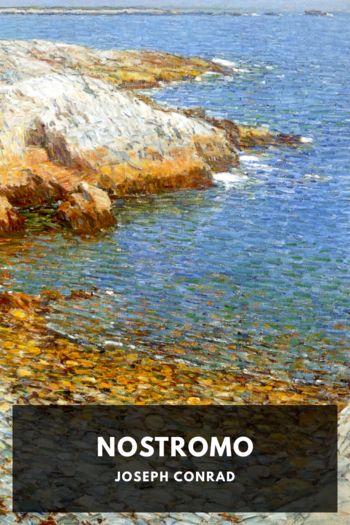Nostromo - Joseph Conrad (books to read fiction .TXT) 📗

- Author: Joseph Conrad
Book online «Nostromo - Joseph Conrad (books to read fiction .TXT) 📗». Author Joseph Conrad
To Charles Gould’s fancy it seemed that the sound must reach the uttermost limits of the province. Riding at night towards the mine, it would meet him at the edge of a little wood just beyond Rincon. There was no mistaking the growling mutter of the mountain pouring its stream of treasure under the stamps; and it came to his heart with the peculiar force of a proclamation thundered forth over the land and the marvellousness of an accomplished fact fulfilling an audacious desire. He had heard this very sound in his imagination on that far-off evening when his wife and himself, after a tortuous ride through a strip of forest, had reined in their horses near the stream, and had gazed for the first time upon the jungle-grown solitude of the gorge. The head of a palm rose here and there. In a high ravine round the corner of the San Tome mountain (which is square like a blockhouse) the thread of a slender waterfall flashed bright and glassy through the dark green of the heavy fronds of tree-ferns. Don Pepe, in attendance, rode up, and, stretching his arm up the gorge, had declared with mock solemnity, “Behold the very paradise of snakes, señora.”
And then they had wheeled their horses and ridden back to sleep that night at Rincon. The alcalde—an old, skinny Moreno, a sergeant of Guzman Bento’s time—had cleared respectfully out of his house with his three pretty daughters, to make room for the foreign señora and their worships the caballeros. All he asked Charles Gould (whom he took for a mysterious and official person) to do for him was to remind the supreme government—El Gobierno supreme—of a pension (amounting to about a dollar a month) to which he believed himself entitled. It had been promised to him, he affirmed, straightening his bent back martially, “many years ago, for my valour in the wars with the wild Indios when a young man, señor.”
The waterfall existed no longer. The tree-ferns that had luxuriated in its spray had died around the dried-up pool, and the high ravine was only a big trench half filled up with the refuse of excavations and tailings. The torrent, dammed up above, sent its water rushing along the open flumes of scooped tree trunks striding on trestle-legs to the turbines working the stamps on the lower plateau—the mesa grande of the San Tome mountain. Only the memory of the waterfall, with its amazing fernery, like a hanging garden above the rocks of the gorge, was preserved in Mrs. Gould’s watercolour sketch; she had made it hastily one day from a cleared patch in the bushes, sitting in the shade of a roof of straw erected for her on three rough poles under Don Pepe’s direction.
Mrs. Gould had seen it all from the beginning: the clearing of the wilderness, the making of the road, the cutting of new paths up the cliff face of San Tome. For weeks together she had lived on the spot with her husband; and she was so little in Sulaco during that year that the appearance of the Gould carriage on the alameda would cause a social excitement. From the heavy family coaches full of stately señoras and black-eyed señoritas rolling solemnly in the shaded alley white hands were waved towards her with animation in a flutter of greetings. Dona Emilia was “down from the mountain.”
But not for long. Dona Emilia would be gone “up to the mountain” in a day or two, and her sleek carriage mules would have an easy time of it for another long spell. She had watched the erection of the first frame-house put up on the lower mesa for an office and Don Pepe’s quarters; she heard with a thrill of thankful emotion the first wagon load of ore rattle down the then only shoot; she had stood by her husband’s side perfectly silent, and gone cold all over with excitement at the instant when the first battery of only fifteen stamps was put in motion for the first time. On the occasion when the fires under the first set of retorts in their shed had glowed far into the night she did not retire to rest on the rough cadre set up for her in the as yet bare frame-house till she had seen the first spongy lump of silver yielded to the hazards of the world by the dark depths of the Gould Concession; she had laid her unmercenary hands, with an eagerness that made them tremble, upon the first silver ingot turned out still warm from the mould; and by her imaginative estimate of its power she endowed that lump of metal with a justificative conception, as though it were not a mere fact, but something far-reaching and impalpable, like the true expression of an emotion or the emergence of a principle.
Don Pepe, extremely interested, too, looked over her shoulder with a smile that, making longitudinal folds on his face, caused it to resemble a leathern mask with a benignantly diabolic expression.
“Would not the muchachos of Hernandez like to get hold of this insignificant object, that looks, por Dios, very much like a piece of tin?” he remarked,





Comments (0)